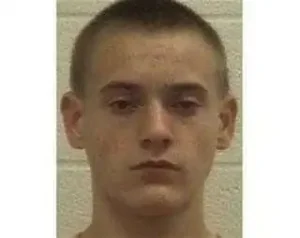Douglas Thomas was executed by the State of Virginia for a double murder
According to court documents seventeen year old Douglas Thompson was dating a fourteen year old girl whose parents did not approve of the relationship. Thompson would shoot and kill her parents, Kathy and J.B. Wiseman, with a shotgun while the fourteen year old encouraged him on.
Douglas Thomas was arrested, convicted and sentenced to death
The fourteen year old was tried as a juvenile and released when she turned 21
Douglas Thomas was executed by lethal injection on January 10 2000
Douglas Thomas Photos

Douglas Thomas FAQ
When Was Douglas Thomas Executed
Douglas Thomas was executed on January 10 2000
Douglas Thomas Case
(The execution of Douglas Christopher Thomas in Virginia for a crime he committed when he was 17-years-old drew considerable attention because his co-defendant served only seven years for the same crime. He is the first of three death row inmates scheduled to die this month for crimes committed when they were minors. Thomas talked with PNS correspondent Dennis Bernstein about fairness and his fate three days before he died. Bernstein is executive producer of the Pacifica radio daily news show “Flashpoints.”)
Douglas Christopher Thomas was executed Monday for a crime he committed when he was 17-years-old. Thomas, who was 26, spent his entire adult life on death row. He was prepared for Virginia Governor James S. Gilmore’s refusal to sign a stay of execution, saying he was ready to die. “The whole process that you go through while being on death row prepares you to die,” he said, “because you’re faced with death every day. If it is God’s will that I die at 26, then I’m prepared to go.”
Douglas Thomas spoke with me Friday afternoon, January 7, by telephone from his death row cell. He was calm, forthright and quite focused as he repeated his claim that his girlfriend, Jessica Wiseman, masterminded the 1990 murder of her parents and fired the shot that killed her mother. Several federal court decisions and new evidence support Thomas’ claim. Because Wiseman was 14 at the time of the crime, she is now free. Thomas said he was not bitter about this, but was troubled that “she was given only seven years, and she is free to resume her normal life while I’m four days away from paying the ultimate price for something we both participated in.”
Douglas Thomas initially took the blame for the 1990 double murder of James and Catherine Wiseman. He confessed without advice of counsel and while he was high on drugs and alcohol. Like many child and juvenile offenders, Thomas had an extremely difficult childhood. His parents divorced before he was born — Thomas did not meet his father until last year. At two, his mother left him to be adopted and raised by his grandparents. When he was twelve, his life unraveled. Several close relatives, including his grandparents, died suddenly. He was shuffled back to his mother, though the two of them did not get along. In 1989, at 16, Thomas attempted to take his own life.
Around this time, he met Wiseman. Douglas Thomas said he was so desperate for love he would have done anything his new girlfriend told him to do. Wiseman’s parents tried to break up the couple, and her father threatened to kill him. “I wanted to be with my co-defendant,” he said, “we were so much in love and her parents were trying to keep us apart. “Jessica just showed me that love I so desperately needed and wanted that I would have basically done anything to keep her around. But I was just a kid when I committed the crime. I mea, I still had the capacity to change, to grow, to learn, and I have.” Thomas felt he should be given a chance to live. “I made the wrong decision. So I can’t be angry at anyone but myself. But I don’t feel the U.S. should execute juvenile offenders because it’s basically saying that we have no chance to be rehabilitated. “I can’t see how at seventeen a court could say, ‘Well, this juvenile doesn’t have the capacity to learn and to grow and to mature.”‘
Douglas Thomas is not alone in his sentiments. In fact, failure to abide by international treaties and UN conventions regarding the execution of youthful and child offenders has made the United States a pariah state. Amnesty International reports 191 states have joined a “global consensus against executing child offenders.” The United States has earned the “shameful distinction of leading a tiny and dwindling group of states…. Only five countries outside the United States are known to have executed child offenders since 1990.” In that decade, the U.S. has executed 10 child offenders, more than the five other countries combined. Chris Thomas’ execution means the United States is the first country in the world to execute a juvenile offender who claimed that such an execution violates international law and well established fundamental norms of international human rights. Two more death row inmates convicted of crimes as minors are scheduled to die this month — Steve Edward Roach in Virginia on Jan. 13 and Glen Charles McGinnis in Texas on Jan. 25.
The stay of execution in June left him with “mixed feelings,” Thomas said. “Since I’ve been on death row I’ve been searching for one thing and that’s finality. In June I thought finally something is going to happen. I’m either going to be given life in prison or I’m going to die. “When the stay came down I was happy for my family because I’m still here and that made them happy. Personally, I knew I was going back and would have to go through this whole process over again and I was a little disappointed.”
Asked what he would do if set free, Thomas listed three things. “The very first thing I would do would be to go to church, get down on my hands and knees and thank God because it would truly be a miracle. The second thing would be to try to put all this behind me and try to get some normalcy back in my life. Try to get a job. Try to do something positive — maybe join the military for the discipline, the adventure, the traveling and the camaraderie.”
Thomas worked hard to create some normalcy in his life. He earned his GED and reestablished family ties, including with his estranged dad. “He read in the newspaper that I had gotten an execution date and he called the prison and he requested to speak with me,” said Thomas. “I called back and we communicated back and forth on the telephone. “This past June when I came down to Greenville [for the execution] they allowed him to come back and visit me and that was the first time I had ever seen him in my life. It meant a great deal, because even though he wasn’t there in the past, he did at least try and make an effort now.”
http://www.pacificnews.org/jinn/stories/6.01/000111-execution.html









